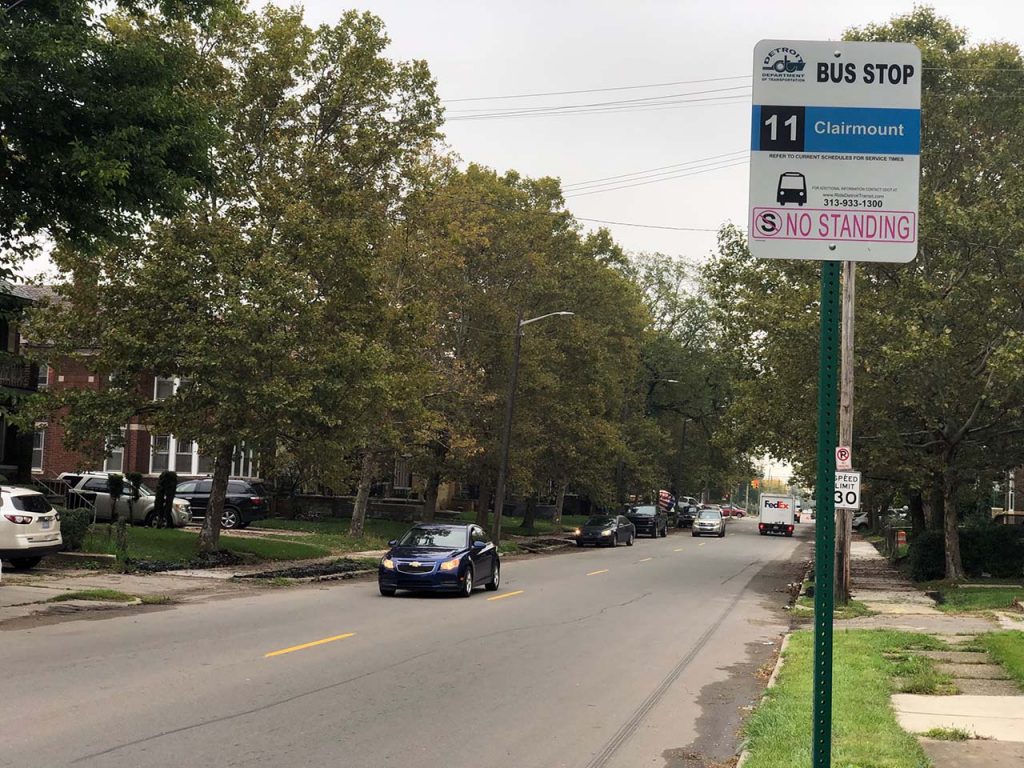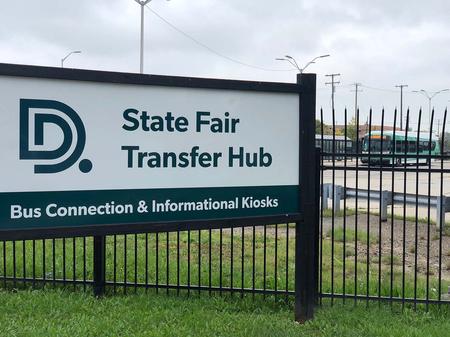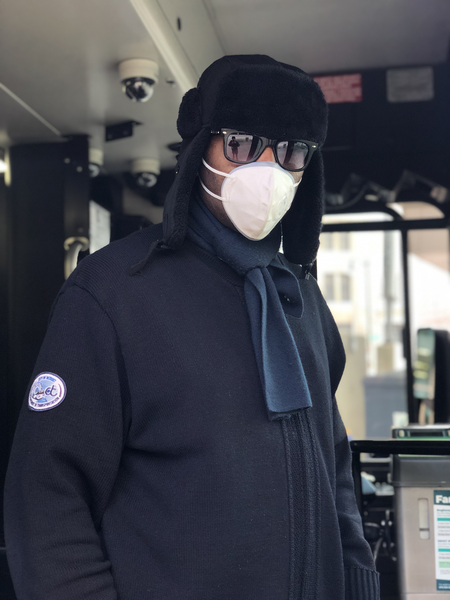As DDOT Cuts Service, Bus Riders and Drivers Worry About the Coming Winter
The Detroit Department of Transportation is changing its schedule in November, cutting frequency on most of its lines and getting rid of others.


Jimmie Berry is waiting for the bus. So are a lot of people at the State Fairgrounds Transit Center on a Thursday afternoon.
“This bus just came. We’ve been waiting an hour and a half for it,” Berry says, pointing to an approaching bus that travels up and down Woodward Avenue. It’s one of the most popular transit lines in Detroit.
“They’ll just pull over there. It will be three, four, five buses over there just sitting, talking. Like the DDOT schedule is real messed up.”
Wait times for city buses will get longer this winter. The Detroit Department of Transportation is changing its schedule in November, cutting frequency on most of its lines and getting rid of others, like Tireman, Junction and Clairmount. City officials say the temporary changes will make the buses more reliable. But riders like Berry, who rely on the buses to travel between jobs, disagree. He has two jobs and rides across the region from Warren, where he works at the Chrysler plant, to the west side of Detroit.
“When I map it out on my phone, it says I’m going to be on time. But then, when I actually go about my route, for example, if I leave Eight Mile and Mound, it will take me three and a half hours just to get to Schoolcraft. When in a car, or if the buses were running right, that’s an hour trip. A car, that’s a 30-minute trip,” Berry explains.
The 29-year-old says there was a time when the buses ran better, back when they were free at the beginning of the pandemic. Now, he says the service gets worse every day.
“And then, on top of that, it’s kind of dangerous for us at night catching the bus. We got our moms, kids, out here catching the bus. Crazy stuff going on happening at night,” Berry says. “I feel all the buses should be on time.”
“We got our moms, kids, out here catching the bus. Crazy stuff going on happening at night. I feel all the buses should be on time.” –Jimmie Berry, bus rider
Many bus riders WDET spoke with did not know the schedules were changing in November. Most were disappointed when they found out. City officials claim the changes will make routes more consistent.
“You have different frequencies on certain routes,” says City of Detroit Chief Operating Officer Hakim Berry (no relation to Jimmie Berry). He oversees DDOT and other city services. “Some of them, let’s say, were 15 minutes, and they were not hitting that 15 minutes because there was a gap. Then you’ll see some buses on line where it will be a couple together, and then you’ll see that gap. And when that happens, that throws off the frequency.”
A lot has changed with DDOT in the last year. Workers went on strike at the onset of the pandemic. They held another strike in the fall of 2020, calling for increased safety measures to protect themselves from the COVID-19 pandemic and general threats of violence by passengers. While the DDOT implemented new sanitation standards and barriers for drivers, employees stopped getting hazard pay last summer, even after the city received millions of dollars in federal relief.
“The city needs to find some way to make sure that the people who have been on the front line since this thing started and before are compensated or feel appreciated,” says Glenn Tolbert, president of the Amalgamated Transit Union – Local 26, which represents Detroit’s bus drivers. “As an operator, you don’t want to leave anybody at the bus stop … the days of packing in like sardines are gone.”

While Tolbert is concerned that more people will be waiting at stops because of the reduced service, city officials say ridership data shows fewer people riding in 2021 than before the onset of COVID-19.
“We’re at about 50% less than what we’ve been running since the pandemic has started,” says Hakim Berry.
Still, monthly ridership has averaged above 700,000 this year. Transit advocates argue that vulnerable transit riders are not hearing about the changes.
“We have a large population that depends on public transportation that is not aware of Zoom or internet services — our senior community. We have a lot [of people] that are not able to go online,” Tarnetta Carter told Detroit City Council in September.
Others argue that DDOT should not be making any changes while it receives an influx of federal funds. DDOT is expected to get more than $50 million from the American Rescue Plan Act, besides the $64 million it received from past relief packages.
“We are already experiencing a lack of adequate service to begin with,” transit organizer Renard Monczunski told City Council in September. “What is inexplicable is that we have a lot of federal money coming in from the American Rescue Plan, and we don’t have a plan on how the department is going to use this money to enhance the department, and yet we’re hearing cuts.”
“The city needs to find some way to make sure that the people who have been on the front line since this thing started and before are compensated or feel appreciated.” –Glenn Tolbert, president of the Amalgamated Transit Union – Local 26
In a February memo, DDOT director Mikel Oglesby wrote that while bus trips stayed free, the department expected to lose $1.7 million at the farebox every month, resulting in a $6 million revenue deficit for 2021. Collections resumed mid-March.
Dozens of drivers and mechanics left during the pandemic, even after the city and the bus drivers’ union agreed to a new contract. Oglesby says it’s an industry-wide problem.
“Every system is dealing with it their own way,” Oglesby said during a September public meeting to discuss the changes. “I think what we need to do is fix the base and then grow. It’s that simple.”
But some DDOT bus drivers say the changes will not attract new employees because the cuts will exacerbate tension between operators and riders, especially as the weather gets colder.

“DDOT needs to do something now,” says coach operator Mitchell Owens. “They don’t need to wait until the snow hits. They need to be acting now.”
Owens says there are a lot of different problems at DDOT. Most Detroiters are still unvaccinated, and Owens says mask mandates have been hard to enforce. He says some buses go without regular tuneups, increasing the risk of accidents.
“The drivers are up against these situations, so you know what? The drivers say, ‘I’m not coming,'” says Owens.
Owens says a vicious cycle repeats in Detroit — overworked and poorly paid drivers skip work, and passengers get angry and sometimes confrontational. He says nobody wants to work in that environment, and the service changes won’t make things better.
“It’s hogwash. That’s what it is. And if I could say a different name, I’d put it out there too, but I’m trying to be respectful.”
Owens says he’s not sure how much longer he’ll stay at DDOT. He says many of his former co-workers have found new jobs, working for other transit companies, or just doing something else entirely.
A lot of passengers are considering their options outside of DDOT, too. But for many, the alternative means trying to save up thousands of dollars to buy a car.
Listen: Riders and drivers express concerns about upcoming service cuts on Detroit buses.
Trusted, accurate, up-to-date.
WDET strives to make our journalism accessible to everyone. As a public media institution, we maintain our journalistic integrity through independent support from readers like you. If you value WDET as your source of news, music and conversation, please make a gift today.
